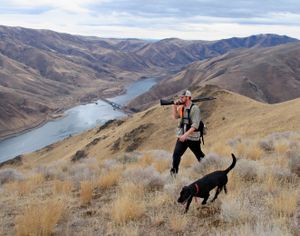Check this list before hunting in Idaho, Washington
HUNTING -- 'Tis the season for hunters. More accurately, the seasons.
Idaho general deer hunting opens Oct. 10; Washington's on Oct. 15. And many more have already opened or are poised to open.
Following are some points for sportsmen to consider at this busy time compiled by Idaho Fish and Game scribe, Roger Phillips. Check them out and check them off. Could save you some grieve down the backroad.
Double check license and permits: Not very exciting, but few things spoil a hunting trip quicker than a citation. Make sure you have the correct hunting license and permits for the animals you are hunting, and they are for the area you are hunting. It’s your responsibility to purchase the correct licenses and permits, not the person at the sporting good store. Also, please remember to fill out your hunt reports in a timely manner.
Check vehicles, RVs and ATVs: Tires in good shape? Electrical and water systems working in your RV? Batteries fully charged and in good condition? All registrations up to date? We ask a lot of our vehicles and RVs during hunting season, and breakdowns can be time-consuming and expensive, especially if vehicles have to be towed out of the backcountry.
Make checklists: There’s so much to bring along on your hunting trips and so many small-but-important items. Charging cable for your GPS unit? You don’t want to be 50 miles from a town before you discover you don’t have it. Gun oil? Might come in handy if you have a rainy day in the woods. Smartphones are a good place to store checklists, so are good, old-fashion, pocket-sized spiral notebooks, which are low-tech, fool proof and don't have batteries.
Expect to succeed, and be prepared: This goes beyond having a sharp knife and a game bag. If weather is warm, have a game plan to get an animal out of the woods and properly cooled and stored, whether it’s hanging at camp or at a meat processor. Carry all the essentials with you when you’re hunting because you never know when you will harvest an animal. It’s tempting to take a short walk to check out a hunting area and look for sign, but then you might spot an animal and take off without all your meat processing equipment.
Make it a group effort: Gather your friends and family, and make it a point to bring someone else into the mix, be it a youngster, a teenager, or an adult who has expressed an interest in hunting. It’s always fun experiencing hunting through a new set of eyes and share the wonder of going into the woods, fields and marshes in the fall.
Take lots of photos: Memories are precious, and hunting photos can last generations. Smartphones mean you always have a camera available, and they can take some great photos. But a point-and-shoot camera has many advantages. Its batteries last longer, and it typically gives you more photographic options than a smartphone, which usually means better photos. Regardless of what you carry, shoot lots of photos, and not just trophy shots. Capture the whole experience, from a misty sunrise on the mountain to the campfire gatherings at night.
Savor the moment: Hunting can be hard work, and even when we try not to, we put a lot of pressure on ourselves to harvest. Don’t overlook those perfect moments, whether it’s listening to the birds early in the morning before shooting hours, watching a doe and fawn meander across a meadow, or a watching a brilliant sunset from a scenic spot. Hunting is about more than harvesting animals, and appreciating all aspects of it rewards you on many levels.
Be a keen observer: Nature is a mystery you will never unravel, but it drops clues on you every time you’re outdoors. Do ducks fly more before a weather change? How does a full moon affect when and where you see animals. Does a chattering squirrel means there’s something moving in the forest? Why is there consistently more signs of game in certain areas that appear exactly like other areas? When something piques your curiosity, try to learn from it. Watch for patterns that help you better understand nature.
Celebrate the whole process: Hunting has many elements, and they can be enjoyed and shared with others, even people who don’t hunt. Keep the spirit of the hunt alive by sharing a meal prepared with wild game, or host a potluck where everyone brings a favorite game dish. Get together and make sausage, jerky or hamburger from the game you harvested and share it with the group. Meet for an evening and share photos and stories from your hunts. Camaraderie is a big part of hunting, and there’s no reason it can’t continue after hunting camp ends.

